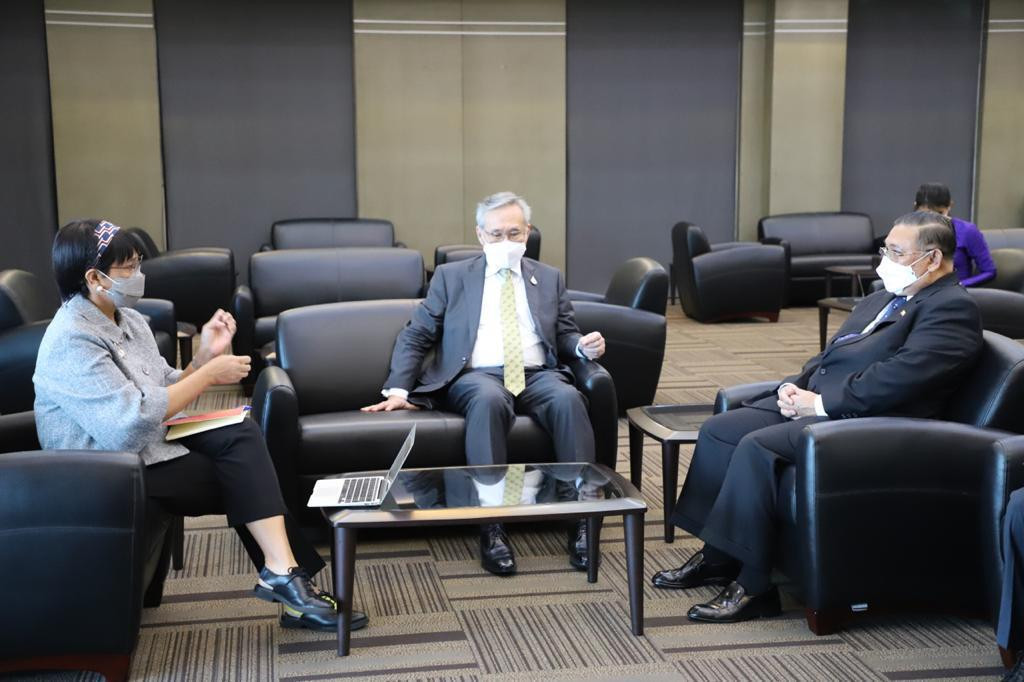Popular Reads
Top Results
Can't find what you're looking for?
View all search resultsPopular Reads
Top Results
Can't find what you're looking for?
View all search resultsWill Indonesia’s diplomacy solve Myanmar crisis?
Indonesia needs to be active to ensure that bloodshed can be avoided and prevented at all cost.
Change text size
Gift Premium Articles
to Anyone
D
emocratic transition is a hard journey. Its outcomes cannot be taken for granted. It could lead to democratic consolidation, democratic stagnation or democratic regression.
The worst outcome is the termination of democracy, usually by the military. This is the case in Myanmar. The democratic transition that started in 2010 has now been disrupted by the military’s takeover on Feb. 1. The military, the Tatmadaw, has declared invalid the results of the November 2020 general elections that delivered a landslide victory to the National League of Democracy (NLD) led by Aung San Suu Kyi.
The world immediately called on ASEAN, of which Myanmar is a member, to play an active role in addressing the problem. Each ASEAN member state has its own opinion on the matter. It was Indonesia, the largest member of ASEAN and the third-largest democracy in the world, that took the initiative to bring ASEAN together.
Foreign Minister Retno Marsudi immediately engaged in a flurry of diplomatic visits and talks with her ASEAN counterparts and also with China. It seems that Minister Retno is seeking to build ASEAN’s common position on how the regional bloc should respond, and how to address the most serious concern: preventing violence and bloodshed in Myanmar.
That, of course, requires contact and intensive dialogue with the Tatmadaw. ASEAN needs to put pressure on and inform the Tatmadaw that the use of force against demonstrators is not acceptable. ASEAN, especially Indonesia, wants to see maximum restraint on the part of the Tatmadaw, and any solution to the problem should be in line with the wishes of Myanmar’s people and democratic principles.
Unfortunately, some have misunderstood this realistic view as Indonesia’s support for the Tatmadaw and the coup against a democratically elected government. As a result, demonstrations against Indonesia’s role have taken place in Yangon. The protesters demand that Indonesia refrain from making any contact with the junta.
On Wednesday Retno held trilateral talks with her Myanmar counterpart Wunna Maung Lwin and Thai foreign minister Don Pramudwinai at Don Mueang Airport in Bangkok. Retno said during the 20-minute meeting that she underlined the need for all ASEAN member states to respect the principles stipulated in the ASEAN Charter.
Indonesia’s position is actually problematic. First, the easiest choice for Indonesia would be to condemn the coup, stop all contacts, impose sanctions and then sit back and watch CNN to see what happens on the ground. If the Tatmadaw uses force against the demonstrators, then Indonesia can issue a new condemnation, sit back and watch CNN again.
Such an approach would clearly give us a feel-good sense, but it would not do much good for the people of Myanmar. That is why Indonesia has not chosen the feel-good approach. Indonesia needs to be active to ensure that bloodshed can be avoided and prevented at all cost.
Second, for the Indonesian public, there is very little sympathy with Suu Kyi. Her image has been tarnished due to her views and policy toward the Rohingya, the minority Muslim ethnic group in predominantly Buddhist Myanmar. Many in Indonesia believe that in order to stay in power, Suu Kyi allowed the Tatmadaw to persecute the Rohingya.
In fact, Suu Kyi actively supported the atrocious treatment of the Rohingya by denying their citizenship, supporting the policy of expelling the Rohingya from Myanmar, and defending the Tatmadaw at the International Court of Justice in The Hague.
Despite such public sentiment in Indonesia, Retno believes that there should be no excuse for the military’s coup and democratic principles should be upheld. And that is why she is actively seeking a solution to the problem.
Third, Indonesia also needs to take action to try to find a solution to the Myanmar problem because of its commitment to ASEAN and the association’s founding principle. The ASEAN Charter clearly commits member states to democratic principles. Doing nothing in the face of the military coup in Myanmar would render ASEAN irrelevant. This will be even more so if the situation in the country deteriorates and leads to violence.
ASEAN could become more divided, and the region’s stability undermined, if the Myanmar crisis exacerbates. ASEAN cannot afford this, especially when the world is facing the serious threat of the COVID-19 pandemic.
Unfortunately, some in Myanmar have misunderstood Indonesia’s intentions. The Indonesian public probably feel the government should just ignore what happens in Myanmar as an internal matter, as both the Tatmadaw and Suu Kyi only care for power and care little for human rights.
However, as a responsible member of the international community, and a member of ASEAN, we should do whatever we can to help a friend in need. And, in politics, it is normal to be misunderstood despite our good intentions.
***
The writer is a senior research fellow, Centre for Strategic and International Studies (CSIS), Jakarta.










